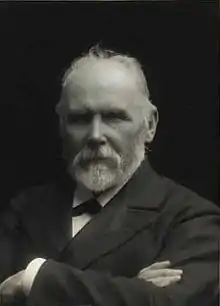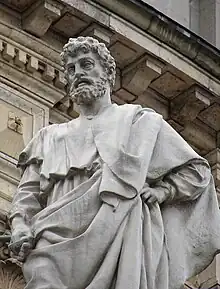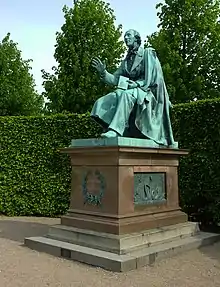August Saabye
August Vilhelm Saabye (7 August 1823 – 12 November 1916), also known as August Wilhelm Saabye, was a Danish sculptor.[1]
August Saabye | |
|---|---|
 Saabye c. 1900 | |
| Born | August Vilhelm Saabye 7 July 1823 |
| Died | 12 November 1916 (aged 93) |
| Nationality | Danish |
| Known for | Sculpture |
| Notable work |
|
Early life and education
Saabye was born in Skivholme, Skivholme parish, Aarhus, the son of vicar Erhard Saabye (1778–1851) and Susanna Schmidt (1785–1856).[1]
He competed as an individual for the Neuhausen Prize in 1854 and although he did not win, his work was praised so that he obtained the support of Herman Wilhelm Bissen and his father's permission to take up sculpture. He studied at the Copenhagen Academy of Fine Arts and then worked in Bissen's studio, learning the neoclassical tradition of Bertel Thorvaldsen. He initially undertook art and design work, then produced small bronzes, reliefs and portrait busts, with elaborate detail and embossing.[2][3][1]

Saabye went to Rome via Paris in 1855, staying there until 1865, learning more about the sculptures of antiquity. Here he started producing larger statues.[3][1]
Career
Saabye was made a member of the Danish Academy of Fine Arts in 1871.[3] His pupils included Anne Marie Carl-Nielsen who studied with him from 1882,[4] and Gerda Madvig.

A major breakthrough and international recognition came in 1883 with what art historian Georg Nordensvan describes as the "elegant nude figure"[3] in marble of Susanna Before the Council. His most popular work is Hans Christian Andersen of 1887 in the Rosenborg Castle Gardens, Copenhagen.[1] In 1888 he was appointed Professor at the Art School for Women in Copenhagen.[3]
Private life
Saabye married Anna Pauline Hansen (1822–1867) on 26 October 1858 in Rome. They had one son, engineer and entrepreneur Johannes Saabye (1860–1946).[5] After his wife's death in Copenhagen, he married Hanne Louise Augusta Baroness Haxthausen (1831–1911) on 29 September 1869, also in Copenhagen.[1]
August Saabye died on 12 November 1916 and is buried in Garnisons Cemetery, Copenhagen.[6]
See also
References
- Munk 1994.
- Weilbach 1900, p. 542.
- Nordensvan 1916, p. 223.
- Mogensen 1992, p. 95.
- Bendtsen & Vinding 1979–84.
- Kendtes Gravsted.
Citations – books
- Bendtsen, P. H.; Vinding, Povl (1979–1984). "Johannes Saabye". In Bech, Svend Cedergreen (ed.). Dansk Biografisk Leksikon [Danish Biographical Dictionary] (in Danish) (3rd ed.). Copenhagen: Gyldendal. Archived from the original on 2 September 2017. Retrieved 29 December 2021.
- Mogensen, Mogens Rafn (1992). "Jugendzeit bis 1900" [Childhood to 1900]. Biographischer Dokumentationsbericht [Carl Nielsen: The Danish Composer: Report on Biographical Documentation] (in German). Vol. 1. Arbon, Switzerland: Eurotext (Mogensen). pp. 1–260. ISBN 3-905564-00-9. Self-published but thoroughly referenced.
- Munk, Jens Peter (1994). "August Saabye". Kunstindeks Danmark & Weilbachs Kunstnerleksikon [Danish Art Index and Weilbach's Art Dictionary] (in Danish) (4th ed.). Copenhagen: Kulturarvsstyrelsen [Danish National Cultural Heritage Agency].
- Nordensvan, G. G. (1916). "Saabye, August Vilhelm". In Westrin, Th. (ed.). Nordisk familjebok [Nordic family book] (in Swedish). Vol. 24 (2nd ed.). Stockholm: Nordisk familjeboks. pp. 232–233.
- Weilbach, Philip (1900). "Saabye, August Vilhelm". Dansk biografisk Lexikon [Danish Biographical Dictionary] (in Danish). Vol. 14 (1st ed.). Copenhagen: Gyldendal. pp. 542–544.
Web page
- "August Saabye's grave". Kendtes Gravsted (in Danish). Archived from the original on 13 May 2012. Retrieved 12 February 2012. With photo.
External links
- August Saabye in Art Index Denmark. Navigation in English, many details in Danish. The site is the central register of artworks and artists in the collections of Danish state-owned and state-subsidised museums and also links to Munk 1994.